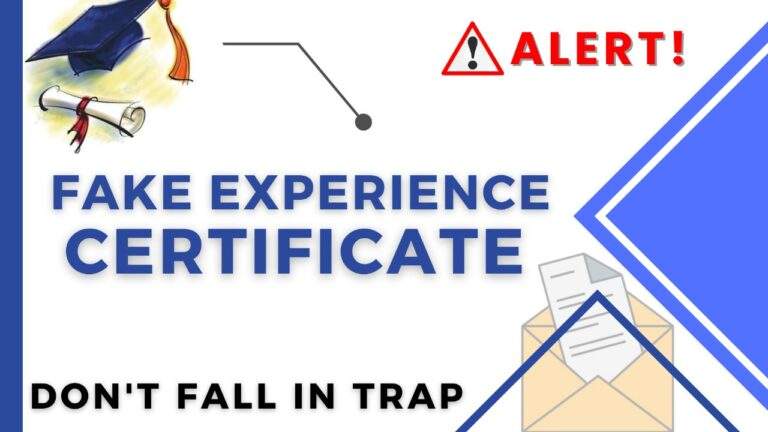Risks of Using Fake Experience Certificates in IT

Introduction
Fake experience certificates have become a widespread problem in the IT sector. Candidates often resort to producing counterfeit documents to secure employment, leading to a compromised recruitment process.
It not only deceives employers but also poses a risk to the safety and integrity of organizations. The demand for experienced professionals in the industry is at an all-time high, which has contributed to the rise of this issue.
Let’s delve deeper into the prevalence of fake experience certificates in the IT sector and understand the impact they have on the industry.
Prevalence of fake experience certificates in the IT sector
According to a survey conducted by First Advantage, a global background screening company, India has the highest rate of discrepancies in education and employment background verification.
It was found that 10.06% of all job applications had discrepancies in employment history, which included fake experience certificates. The IT sector accounted for the highest number of cases of discrepancies, with a rate of 15.04%.
This trend has raised concerns among employers, who have to resort to stringent verification processes to ensure that they are hiring genuine candidates. The issue of fake experience certificates is not only restricted to India but is a global problem that needs to be addressed.
Problems You May Face If You Use a Fake Experience Certificate to Get a Job in IT Sector
Using a fake experience certificate to get a job in the IT sector can lead to several problems. The consequences of getting caught with a fake certificate can be severe, including legal charges and fines. Employers can easily verify the authenticity of an experience certificate by contacting the previous employer, which could result in termination and loss of credibility.
Using a fake certificate can negatively impact an individual’s career prospects. It can lead to a lack of trust and credibility, which can make it difficult to find a job in the future. Even if an individual is hired, their lack of experience could become evident and lead to poor performance, affecting their reputation within the industry.
The company that hires someone with a fake certificate can also face potential repercussions. The fake certificate could lead to poor performance, which could impact the company’s reputation and financial performance. Moreover, hiring an unqualified person could lead to legal issues and financial loss for the company.
Using a fake experience certificate to get a job in the IT sector can have serious consequences. It can impact an individual’s career prospects, as well as the company that hires them. It’s always best to be truthful and honest about one’s qualifications and experience, as it’s the only way to build a successful and sustainable career.
Fake Experience Certificate Legal Action
Using a fake experience certificate is not only ethically wrong but also illegal. If an employer finds out that you have submitted a fake certificate, they can take legal action against you. The potential consequences could include termination of employment, legal fines, and even imprisonment in some cases.
Moreover, companies that hire employees with fake certificates may also face legal action for negligence in hiring practices. In some countries, using a fake certificate can be considered a criminal offense, and the authorities may take legal action against both the employee and the employer.
In addition to legal action, using a fake certificate can also lead to a tarnished reputation and negatively impact your future job prospects. It can be difficult to regain the trust of employers once it is discovered that you have submitted fake documents. Therefore, it is important to always be truthful and transparent in your job search and avoid the use of fake certificates.
Fake Experience Certificate Is a Crime
Using a fake experience certificate to secure a job is a serious crime that can have significant consequences for the individual involved. Such individuals can face criminal charges and even jail time. The reason for this is that using a fake certificate constitutes fraud, which is a criminal offense.
Fraud is defined as the deliberate deception of a person or organization to gain something of value. In this case, the individual is deceiving their potential employer by presenting false information about their work experience.
This misrepresentation can lead to a variety of problems for both the individual and the company, including financial loss, damaged reputation, and even legal action.
If caught, the individual may face criminal charges for committing fraud, which can result in hefty fines and even imprisonment.
In addition, the company that hires someone with a fake certificate may also take legal action against the individual for misrepresenting themselves and potentially causing harm to the company’s reputation and financial standing.
Therefore, it’s crucial to avoid using fake experience certificates and instead focus on building genuine experience and skills in the field.
Fake Experience Certificate Punishment in India
Using a fake experience certificate is a serious offense that can result in severe legal consequences. Depending on the severity of the offense and the jurisdiction in which it is committed, punishments can range from fines to imprisonment. In many countries, using a fake experience certificate is considered a form of fraud, which is defined as intentionally deceiving someone for personal or financial gain.
Individuals who are caught using fake certificates may be subject to a variety of legal penalties, including hefty fines, probation, community service, or even imprisonment. Moreover, the criminal record that comes with a conviction can have a significant impact on the individual’s future job prospects, potentially limiting their career advancement opportunities.
In addition to legal consequences, using a fake experience certificate can also lead to professional repercussions. Companies that discover an employee has used a fake certificate to secure employment may choose to terminate their employment, potentially damaging the individual’s reputation and future employment prospects.
Therefore, job seekers must be honest and transparent in their qualifications and experiences to avoid the negative consequences of using a fake certificate.
Conclusion
Using a fake experience certificate is a serious offense that can lead to severe legal and professional consequences.
Not only can it damage an individual’s career prospects, but it can also harm the company that hires them. Legal action, including fines and imprisonment, may be taken against those who use fake certificates.
Therefore, it is essential to prioritize honesty in the job application process and seek out legitimate job opportunities. Employers should also take steps to verify the authenticity of experience certificates and other documents provided by job applicants.
By doing so, we can ensure a fair and transparent job market and avoid the negative impact of fraud and dishonesty. So, let us pledge to uphold the integrity and ethical practices in the workplace and build a better future for all.





